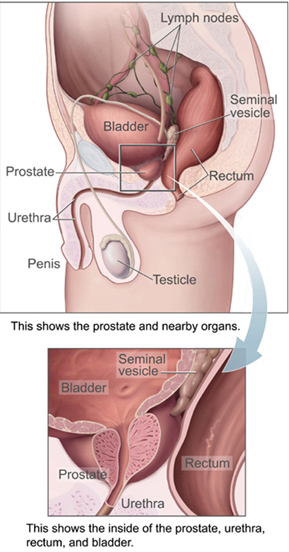 The prostate is a gland of the male reproductive system that produces fluid for semen, which helps to transport sperm during the male orgasm. The prostate fluid is slightly alkaline (pH>7) which helps neutralize the acidity of the vaginal tract, prolonging the lifespan of sperm. The prostate is made up of about 30% muscular tissue; the rest is glandular tissue.
The prostate is a gland of the male reproductive system that produces fluid for semen, which helps to transport sperm during the male orgasm. The prostate fluid is slightly alkaline (pH>7) which helps neutralize the acidity of the vaginal tract, prolonging the lifespan of sperm. The prostate is made up of about 30% muscular tissue; the rest is glandular tissue.
Normally, the prostate is small—about the same size and shape as a walnut. It surrounds the urethra just below the urinary bladder and can be felt during a rectal exam since it located in front of the rectum.
Almost all men will experience some enlargement of the prostate, most by the age of 70. When the prostate becomes enlarged, it may press against the urethra and make the flow of urine weaker or slower, or cause male incontinence. An increase in the size of the prostate or a change in urine flow may indicate you have a condition such as benign prostatic hyperplasia (BPH) or prostatitis.
